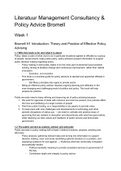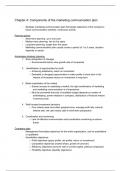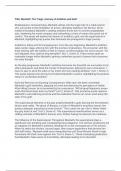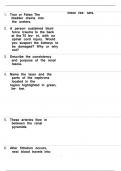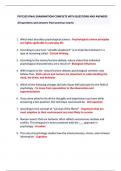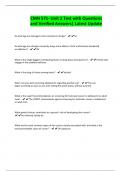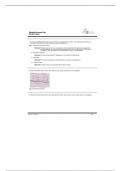Policy Advice Bromell
Week 1
Bromell H1 Introduction: Theory and Practice of Effective Policy
Advising
1.1 WHo this book is for and what it is about
Policy: ideas or plan of what (not) to do in particular situations agreed to officially by a group
of people. Governments make public policy, policy advisors present information to support
public decision making regarding policy.
- Policy making in demcoratic states is for the most part incremental social problem
solving, aiming at iterative change and continuous improvement, rather than radical
innovation.
- Evolution, not revolution
- This book is a practical guide for policy advisors to elected and appointed officials in
government.
- But Many principles also apply to private sector
- Being an effective policy advisor requires ongoing learning and reflection in the
ever-changing and challenging world of politics and policy. This book will help
prepare for practice.
Public servants need to keep refining and improving art of policy advising because:
1. We work for agencies of state with inclusive and coercive powers, thuc policies affect
the lives and wellbeing of a large number of people
2. Paid from public funding, so a responsibility to tax payers to provide value
3. To keep pace with new challenges and developments in technology and other
periodic disruptions of status quo → we need to cultivate and practice ways of
governing that are resilient to disruption and discontinuity with what has gone before,
while retaining our best values and traditions of public service and demcoratic
government.
1.2 The public servant as analyst, advisor and advocate
Public servants in policy making fulfil at least 3 distinct functions: analysis, advising and
advocacy
- Policy analysis: gathering relevant data and turning into information to support
decision making, most commonly identifying optional solutions to a problem, and
assessing evidence for and against. → Evidence-informed, technically competent
and politically neutral.
- Political neutrality meaning to provide consistent services to government of
the day
- Contributes depth and integrity to policy advice
, - Policy advising: bridging gap between analysis and decision, supporting decision
makers with selecting and implementing preferred policy options. → Communicating
policy analysis that has been undertaken, recommendations based on this and
support in decision making.
- Duties of public policy advisors”
- Serve government of the da faithfully by providing advice that is
politically neutral and implementing without criticism or re-litigation
- Serve public by promoting better policies and protecting long-term
interests of society
- Respect and improve democratic process
- Sound analysis are important, but an effective advisor must win over
confidence of decision makers to secure licence to operate with rigour and
relevance in real world and politics.
- Policy advocacy: persuading and advocating for recommended options.
Communicating analysis in ways that persuade to win political support → mastery of
rhetorical and dialectical skills and defining a problem according to various points of
view
- But this can be risky business: on what basis and whose interests are you
advocating? As unelected officials how are you accountable?
- This book aims to improve effectiveness in policy advice role
1.3 Policy making in theory and practice
Policy making is often taught as cycles of rational, goal-oriented decision making (Laswell),
but it does not necessarily occur in textbook order
- Howlett et all: a cycle of problem solving attempts, which results in policy-learning
through repeated analysis of problems and experimentation with solutions
1. Agenda setting
2. Policy formulation
3. Decision making
4. Policy implementation
5. Policy evaluation
- Althaus, Bridgman and Davis: Australian policy cycle. Offers descriptive heuristic
device to assist learning and problem solving, as well as prescriptive stage model
that encourages orderly routine. Their stages in the policy cycle:
1. Identifying issues
2. Policy analysis
3. Policy instruments
4. Consultation with relevant agencies and interest groups
5. Coordination, ensuring funding etc
6. Decision
7. Implementation
8. Evaluation
Problem with policy cycles and models: taken at face value bear little relation to how it’s
actually done in practice:
- Policy cycle model does not tell you when stage is completed and when to move to
next. How do you know problem is adequately defined?
1
, - → Better to think of some stages (like gathering information) as ongoing
processes through all stages
- it oversimplifies complex problem-solving processes
- → Actually iterative: repetition, trial and error, advancing and back-tracing.
- Tend to be top-down focussed on decision making within government, not capturing
non-state actors as well.
Policy cycles and stages can be useful if they help you make sense of the process and
remind you what to think about
- Bardach and Patashnik: “The Eightfold Path”: not of equal significance in very case,
not in order, but iterative
1. Define problem
2. Assemble some evidence
3. Construct alternatives
4. Select criteria
5. Project the outcomes
6. Confront the trade-offs
7. Stop, focus, narrow, deepen, decide
8. Tell story
- Mintrom’s six key steps in policy analysis: evidence gathering and assessing
throughout process
1. Engage in problem definition
2. Propose alternative responses to the problem
3. Choose criteria for evaluating each alternative policy response
4. Project the outcomes of pursuing each policy alternative
5. identify and analyse trade-offs among alternatives
6. Report findings and make argument for most appropriate response
→ but: effective policy advising is about relationships, integrity and communication
- Relationships: policy advising requires building and maintaining relationships with
various audiences and clients.
- Integrity: duty to do job in a way to secure confidence of present and future
politicians, legislators and public. Personal and professional integrity.
- Communication: power of persuasion and effective communication in writing and
conversation to a range of audiences. It’s a social activity
1.4 Learning on the job
Many policy advisors come on the job with no formal training in public policy, which some
prefer so they don’t adhere too much to “the right way to do things”, this is seldom effective.
There is no relationship of trust yet with decision makers, the trust needs to go both ways
- But building confidence is an art, not a science.
It requires apprenticeship: an on-the-job training in which apprentice is taught, coached and
mentored by experienced practitioners, often in combination with formal training like
university. Mastering this craft takes years. As a new policy advisor you must be willing to
learn.
- It is your task to seek this apprenticeship with experienced persons on the team
- But does not mean it’s a completely formal arrangement.
2
, 1.5 Ethical policy advising
Being an effective policy advisor requires cultivation of both talent and virtue. Without virtue
is dangerous, without talent/skill is useless. Virtue is somewhat a prerequisite for talent.
Ethics matter for public policy:
1. State is involuntary: includes everyone in territory through coercive power.
2. An unscrupulous advisor can manipulate clients with misleading, false or partial
information and selective advice
3. Policy advisors in public sector are public servants, not only government servants.
They are guardians of public value also in the long-term.
Four ethical competencies:
1. Civility: engaging in reasoned, reflective judgments making itself accountable to
diverse public
2. Fidelity to the long-term public interest
3. Respect for citizens as responsible agents, more than just objects
4. Prudence: exercise of practical wisdom
- The individual must be well-rounded and a team players: looking for candidates with
capacity to develop political “nous” → skills to navigate en find ways, valueing soft
skills such as persuasive communication, effective negotiation, collaboration
- → DO you have the skills of a capable apprentice?
Week 2
Bromell H4 Doing policy analysis
4.1 Introduction
This book is not a textbook but practical guide, so this chapter introduces policy analysis in
practice. An effective policy advisor neds to develop skills with analysis to contribute depth
and integrity to policy advice.
- The risk in systematising what policy analysts do is that it gives it the appearance of
being rational and systematic, but it’s largely time-constrained and pragmatic in
3


